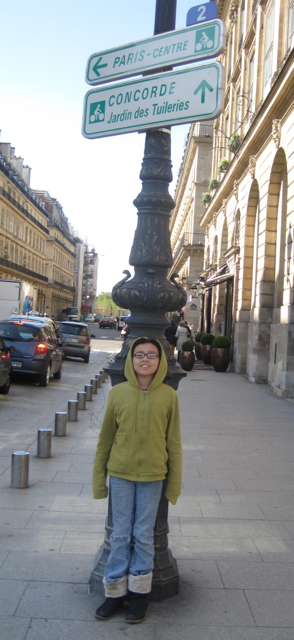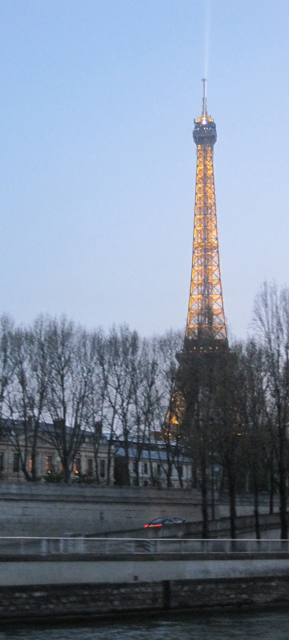
I took a walking tour of Paris a couple of years ago, and when we got to the Place de la Concorde the guide made a big point of telling us we shouldn’t call July 14 “Bastille Day.” He said the holiday came about on July 14, 1790, was originally called the Fête de la Fédération, and focused on the new nation and reconciliation, not the storming of the Bastille on the same date in 1789.
From that, we get Le Place de la Concorde. The picture at the right with a little Siobhán will show you the way there.
I was there this past week but I didn’t take any photos. I was scoping out the U.S. Embassy, Thomas Jefferson’s former house, for some scenes in my novel in progress, and didn’t think I should take pictures while looking suspiciously at the place. The gendarmes were everywhere, as were cameras. I noticed that you can’t walk by the embassy because of security, but you can drive past it. Interesting.
But back to France and “Bastille Day.”
I was in France for American Independence Day, and now I’m in the U.S. for Bastille Day. Don’t know what to make of that, but it’s made me think of my relationship to two of the three countries I visit most: France and England (the third is Ireland, my own true love). I teach British literature, but I’m no Anglophile. I like and dislike British things just about as rationally as I like and dislike American things. I’m the same way with France. I love speaking French. I love walking around Paris. But I can’t go crazy over French food, which I find bland, and have just as complex a set of relationships with French people as I do with Americans. I like some, dislike some, and don’t find generalizations easy.

Very few of the French people I’ve met fit the American stereotype of the arrogant, snobbish French. They’re different, definitely. Our cultures leave marks on us. But differences between two western people with so many things in common? They’re not so significant. The French helped us win our independence. We helped them beat Hitler. They gave us the Statue of Liberty. We helped them with the Marshall Plan.
We are possibly the two most arrogant people on the planet. That’s where I think most of the American-French animosity comes from. We’re both right about everything, and we can’t both be right, so …
Freedom Fries!
I took my kids there a few years ago when I was assigned to teach a study abroad program. They felt displaced, homesick, a little out of it. But my older daughter just passed out of first semester French at orientation for college. The younger one’s taking French and has a much better accent when she speaks it than most Americans can manage. They’ve both resisted and embraced the culture. My novel’s mostly set there, so I’m doing the same.
Look back to Thomas Jefferson and the U.S. Constitution. There’s as much French in our system as British. We got the Common Law from the British. We got the idea of a written constitution from the French. We got a language from England. We have a planned capital city that looks much more French than English. We’re more interested in theories, like the French, but often impatient with them, like the British. This could go on and on.
We’re the child of those two parents who often seem to detest each other. I was in England, on the way to the France, in 2010 when England played America in the World Cup. I asked my London cabbie who he’d be rooting for.
“England, of course. No offense.” None taken.
 Then I told him I was heading straight to France, and would be in Paris when the game finished. I asked him who the French would be rooting for.
Then I told him I was heading straight to France, and would be in Paris when the game finished. I asked him who the French would be rooting for.
“America, of course. They hate us. They love you Americans.”
So there you go, America. A London cabbie says the French love us. They don’t like to say it out loud. Shy lovers, but tried and true.
Vive la France today. And watch a good French movie now and then. For those who like clear endings, in which all is explained, I recommend Jeunet. If you tolerate ambiguity, go for Louis Malle or Alain Resnais.
